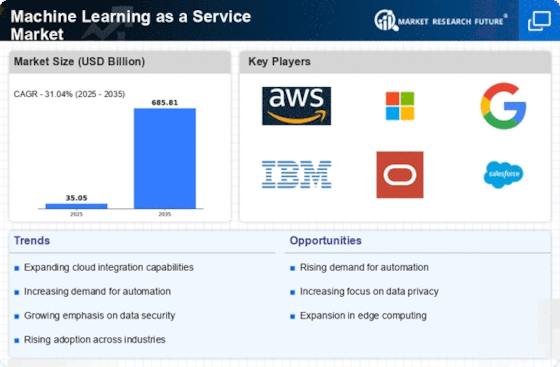Market Trends
Key Emerging Trends in the Machine Learning as a Service Market
The Machine Learning as a Service (MLaaS) market is encountering dynamic and transformative patterns, shaping the landscape of the innovation business. As organizations increasingly perceive the value of machine learning, MLaaS has arisen as a pivotal player, offering accessible and scalable arrangements. One significant pattern is the rising adoption of MLaaS across different areas, ranging from healthcare and finance to manufacturing and retail. This widespread integration is filled by the longing of organizations to leverage machine learning capabilities without the requirement for broad in-house ability or infrastructure.
Besides, the market is seeing a surge in demand for cloud-based MLaaS arrangements. Cloud platforms give an adaptable and practical climate for conveying machine learning models, allowing organizations to seamlessly scale their operations. The accessibility and scalability of cloud-based MLaaS work on implementation as well as engage organizations to harness the force of machine learning without the weight of significant straightforward ventures. This shift towards cloud-based arrangements aligns with the broader pattern of digital transformation, as organizations look for agile and effective ways to convey advanced innovations.
Another notable pattern shaping the MLaaS market is the increasing emphasis on clarity and interpretability of machine learning models. As machine learning applications become more pervasive in dynamic cycles, the requirement for understanding and confidence in these models has developed. Organizations are focused on arrangements that provide transparency, allowing them to understand the decisions taken by machine learning programs. This trend is especially important in industries with strict regulatory requirements, such as banking and medical care, where clearness is critical for compliance and responsibility.
As machine learning applications become more industry-explicit, merchants are creating redid MLaaS contributions tailored to the interesting necessities and challenges of various areas. This industry-driven approach enhances the relevance and viability of machine learning arrangements, encouraging a more widespread and impactful adoption across different domains.


















Leave a Comment